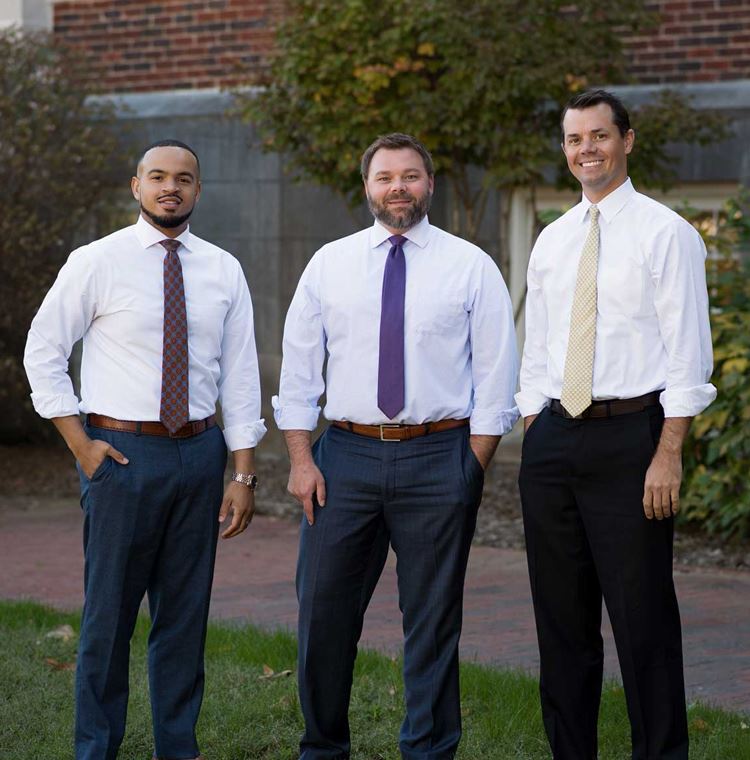
DWI/DUI Defense Lawyer
Chapel Hill & Durham, NC
Your Local Hometown DWI/DUI Defense Lawyers
Driving While Impaired (DWI) is a common and very serious offense that can result in 2 years of imprisonment. Given today’s political environment, if you are accused of DWI it is imperative that you find an attorney with the experience to test the State’s case and ensure an acceptable outcome is reached. No other crime in North Carolina is as scrutinized as Driving Under the Influence (DUI). What this means is that every DWI is being tracked and every Judge and District Attorney is being watched by the State.
This level of scrutiny makes it even more important that you have an attorney who knows how to defend a DWI charge. We are those attorneys. Over the years Our attorneys have defended thousands of Driving While Impaired cases both in District and Superior Courts throughout the state. As such, we have the skill set and experience necessary to handle your DWI case.
Give the Law Office of Matthew Charles Suczynski a call today to discuss your case at (919) 619-3242.
What is a DWI in North Carolina?
As we mentioned earlier, DWI stands for “driving while intoxicated" in North Carolina. Similar to driving under the influence (DUI) in other states, DWI means operating a motor vehicle while under the influence of alcohol, drugs, or a combination of the two substances.
The legal blood alcohol concentration (BAC) limit in NC for drivers over the age of 21 is 0.08 percent. However, lower BAC limits apply to commercial drivers (.04 percent) and drivers under the age of 21 (any detectable amount).
What Is The Difference Between A DUI And A DWI?
The terms DUI and DWI are often used interchangeably, but in some jurisdictions, they can have different meanings. However, the exact definitions and distinctions can vary by state, so it's essential to understand how they are used in the specific legal context you are interested in.
DUI stands for "driving under the influence," while DWI stands for "driving while intoxicated" or "driving while impaired." In some states, these terms are used to refer to different levels of impairment or intoxication, while in others, they are used interchangeably to refer to the same offense.
In general, both DUI and DWI refer to the offense of operating a motor vehicle while under the influence of alcohol or drugs. This can include impairment from alcohol, illegal drugs, prescription medications, or over-the-counter medications that affect a person's ability to operate a vehicle safely.
Some states use the term DUI to refer specifically to driving under the influence of alcohol, while DWI may be used for driving under the influence of any substance, including alcohol or drugs. In other states, the terms may be used interchangeably to refer to both alcohol and drug-related impairment.
It's important to note that the specific laws and definitions regarding DUI and DWI can vary widely by state, and each state may have its own legal standards, penalties, and terminology. Therefore, if you have questions about DUI and DWI laws in a specific state, it's best to consult with a qualified attorney or legal professional who is familiar with the laws in that jurisdiction.
Stop Issues
A major issue in many DWI cases is why the officer initiated the traffic stop. As such, it is important that every step in the stop sequence is reviewed when preparing to defend a Driving While Impaired case. The Law Enforcement Officer needs to establish either a Reasonable and Articulable Suspicion that Criminal Activity is afoot or Probable Cause that a crime is being committed or has been committed. We have challenged the basis for traffic stops in courts across North Carolina many times with favorable outcomes to his clients.
Standardized Field Sobriety Tests (SFSTs)
If you are accused of Driving While Impaired the officer probably asked you to perform some Standardized Field Sobriety Tests (SFSTs). These tests are designed to establish a probability that the individual performing the test is impaired. Three of these tests (One-leg Stand, Walk & Turn and the Horizontal Gaze Nystagmus (HGN)) are scientifically validated and approved for use by the National Highway Traffic Safety Administration (NHTSA) in the detection of drunk drivers.
These tests are only scientifically valid if performed with strict adherence to NHTSA standards. Many times officers do not know what the standards are or why they are looking for what they are looking for. Our attorneys understand these tests and are fully prepared to keep the results of any of these tests from coming into evidence if the officer made a mistake.
Additionally, our attorneys can help ensure tests such as the finger to nose, ABC recitation and counting tests are not used to establish something they are not validated for. Give the the Law Office of Matthew Charles Suczynski a call today to discuss your case.
Arrest Issues
In order for a Law Enforcement Officer to take you into custody for a Driving While Impaired (DWI) charge they must first develop the Probable Cause to arrest. Probable Cause is defined by the Supreme Court of North Carolina as, “a reasonable ground of suspicion supported by circumstances sufficiently strong in themselves to warrant a cautious man in believing the accused to be guilty.” State v. Zuniga, 312 N.C. 251, 259, 322 S.E.2d 140, 145 (1984).
While this standard is significantly less than what it would take to support a conviction beyond a reasonable doubt, it is still a significant hurdle the State must overcome before arresting someone and getting him to the Intoxilyzer room. Our attorneys have substantial experience challenging the State’s case on grounds of lack of Probable Cause for Arrest. Such an attack is based almost completely on the facts of the case and as such a person accused of a DWI needs an attorney who will take the time to get to know the facts of their individual case.
The Law Office of Matthew Charles Suczynski, PLLC prides itself on the personal attention and in-depth investigation that is undertaken in each Driving While Impaired case. Please give us a call for a free consultation at (919) 619-3242.
Intoxilyzer 5000/EC-IR II Issues
The State of North Carolina has approved two machines (the Intoxilyzer 5000 made by CMI, Inc. and the Intox EC-IR II made by Intoximeters, Inc.) for use in breath testing for purposes of determining Blood Alcohol Concentrations (BAC). Each machine has its own strengths and weaknesses.
Our attorneys have studied each of these machines and knows what to look for when the State seeks to introduce the results of these tests against his clients. If you are accused of DWI, it is important that you find an attorney who understands the strengths and weaknesses of the machines the State will use to gather evidence against you. Give the the Law Office of Matthew Charles Suczynski a call today to discuss your case at (919) 619-3242.
Post-Arrest Issues
If you are arrested for DWI you will be taken to the Law Enforcement Agencies Intox room where they will ask you to submit to a breath analysis. You will be read your Intox Rights and asked to perform the test. If you refuse to perform the test your license may be suspended for a year depending on whether or not the refusal was willful.
Additionally, if you are deprived of your liberty for an extended period of time your Rights may be violated. If you are accused of a DWI it is important that you find an attorney who will analyze every part of your case so that no stone is left unturned in your defense. Our attorneys will take a comprehensive look at your case from beginning to end to ensure that the State is forced to meet its burden in every way required by law.
Punishments
If you are convicted of Driving While Impaired (DWI) in North Carolina you will face a range of punishments up to a maximum of 2 years in prison. N.C.G.S. §20-179.
| Level | Maximum Punishment | Minimum Punishment |
|---|---|---|
| 1 | 2 years in prison/$4,000 fine | 30 days in prison |
| 2 | 1 year in prison/$2,000 fine | 7 days in prison |
| 3 | 6 months in prison/$1,000 fine | 72 hours in jail or 72 hours of community service |
| 4 | 120 days in prison/$500 fine | 48 hours in jail or 48 hours of community service |
| 5 | 60 days in prison/$200 fine | 24 hours in jail or 24 hours community service |
How the level of punishment is determined comes from a range of factors including prior DWI convictions, facts of the DWI traffic stop, who was in the car, if anyone was hurt, if the individual has taken affirmative steps to correct any alcohol problem, etc. Whether your case is for trial or plea, the Law Office of Matthew Charles Suczynski will ensure that if you are convicted of DWI you will be positioned so that the minimum punishment is obtained. This is accomplished by Matthew personally reviewing each case and working with each client to put the best foot forward in court. Give the Law Office of Matthew Charles Suczynski a call today to discuss how he can help you at (919) 619-3242.
Limited Driving Privileges
Depending on the stage of a Driving While Impaired case and the facts surrounding it, the Law Office of Matthew Charles Suczynski may be able to help you obtain a limited driving privilege.
The different types of Limited Driving Privileges are:
- Pre-Trial Limited Privilege
- Post-Conviction Limited Privilege
- Refusal Limited Privilege
- Interlock Limited Privilege (required when BAC is .15 or greater)
As part of each DWI representation, our attorneys will consult with the client and help them to obtain any Limited Driving Privilege they may be eligible for.
Contact us today to discuss any aspect of your case at (919) 619-3242.


What Makes Us Different
Reach Out to Our Legal Team
-
Over 40 Years of Combined Legal Experience in Criminal Defense & Traffic Law
-
Committed to Providing Clients with the Highest Possible Standard of Legal Representation
-
Proudly Serving Clients Throughout Chapel Hill and Durham, NC and the Triangle
Client Testimonials
Hear From Past Clients We've Helped
-
"Successfully Dismissed"
This astounding team of attorneys worked very hard to get my case successfully dismissed. I felt confident that they would get the job done and they did.
- Darlene C. -
"Great Service!"
Reached out to the Law Office of Matthew Charles Suczynski for help and they were able to get to ticket dismissed. I definitely recommend using them.
- Kerry T. -
"Beyond Satisfied With the Results"
These guys are awesome. I had my attorneys handle a traffic citation which I knew I couldn’t beat on my own. I received their correspondence, and boy, I am beyond satisfied with the results. I was not kept in the dark since hiring them.
- Rodney S. -
"Professionals You Can Trust"
Attorneys Matt Suczynski, Mike Paduchowski, and Ray Griffis worked hard on my case to ensure that the best possible result was achieved: MY CASE WAS DISMISSED. The law office paralegals were professionals that kept me informed and obtained documents necess
- Esther B.
